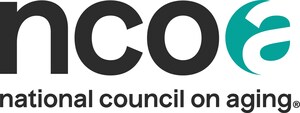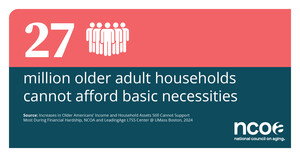New research points to solutions for individuals who lose Medicaid as they age into Medicare
Key takeaways
- New research conducted by NCOA and the LeadingAge LTSS Center @UMass Boston finds that low-income older adults who lose Medicaid coverage when they transition to Medicare experience rising out-of-pocket medical expenses, declining net worth, and worsening health.
- Those who hit the "Medicare Cliff" are more likely to be female, retired, and facing difficult affordability and health coverage challenges.
- The research outlines potential solutions, including updating eligibility criteria for Medicare Savings Programs.
ARLINGTON, Va., June 4, 2024 /PRNewswire/ -- Low-income older adults who lose their Medicaid coverage when they transition to Medicare experience rising out-of-pocket medical expenses, declining net worth, and worsening health, according to new research by the National Council on Aging (NCOA) and Leading Age LTSS Center @UMASS Boston.
With the passage of the Affordable Care Act, many states expanded Medicaid to low-income adults ages 19 to 64 with incomes up to 138% of the federal poverty level. As these individuals become eligible for Medicare, they may lose their Medicaid coverage and be unable to afford Medicare's higher premiums, deductibles, and co-payments.
Known as the "Medicare Cliff," this disruption in coverage can be particularly difficult for those with the lowest incomes who tend to be single women, people of color, and people with complex medical conditions or functional limitations.
"Older adults who rely on Medicaid for health coverage should not be forced to face this kind of financial shock just because they age into Medicare," said Ramsey Alwin, NCOA President and CEO. "One woman living on a fixed income told us that losing Medicaid desperately affected her mental well-being. Our research points to solutions to mend this hole in our country's social safety net."
The research found that the Medicare Cliff population faces several vulnerabilities:
- They have significantly higher out-of-pocket medical costs compared to individuals who are dually eligible for Medicare and Medicaid, and those with Medicare only.
- They experience greater financial resource decline over time, with a diminishing median net worth.
- In the two years after hitting the Medicare Cliff, they experienced a substantial worsening of their health.
People facing the Medicare Cliff told researchers they often were forced to cut expenses in other areas to make ends meet. They said they encountered confusing communication about the transition between Medicaid and Medicare, and they could have benefitted from additional counseling assistance, such as that provided by State Health Insurance Assistance Programs.
The research points to three major areas for policy reform:
- Allow the Medicare Cliff population to maintain Medicaid eligibility as they enter Medicare.
- Improve the education and enrollment process for Medicare Savings Programs (MSPs) without changing eligibility criteria. MSPs help low-income individuals afford the costs of Medicare.
- Change eligibility criteria for MSPs to remove or raise the asset limit and/or synchronize the income eligibility threshold with other benefits, which would enable more individuals to gain assistance.
Standing Back from the Medicare Cliff: Research and Policy Options to Help Low-Income Older Adults is available online for download.
About NCOA
The National Council on Aging (NCOA) is the national voice for every person's right to age well. We believe that how we age should not be determined by gender, color, sexuality, income, or ZIP code. Working with thousands of national and local partners, we provide resources, tools, best practices, and advocacy to ensure every person can age with health and financial security. Founded in 1950, we are the oldest national organization focused on older adults. Learn more at www.ncoa.org and @NCOAging.
SOURCE National Council on Aging

WANT YOUR COMPANY'S NEWS FEATURED ON PRNEWSWIRE.COM?
Newsrooms &
Influencers
Digital Media
Outlets
Journalists
Opted In






Share this article